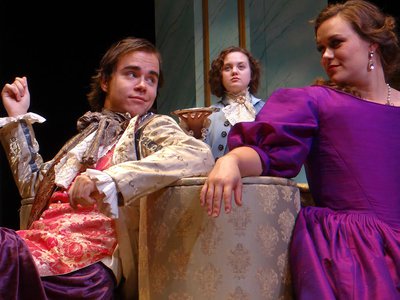
Playwright David Ives (A Flea in Her Ear, Venus in Fur) calls his play The School for Lies a “translaptation” of French playwright Molière’s classic 1666 farce The Misanthrope. Lies is now playing at University Theatre under the direction of Tricia Rodley.
Ives has maintained much of the source material’s language. The play is written in rhyming verse, and Ives adds well-timed modern zingers for comic effect.
Ives’ French aristocracy drops catchwords like LOL and “snark” while dancing to hip hop, and he takes every opportunity to insert a dirty joke and run with it. One of the characters is named Clitander and … well, you see where that’s going.
This device casts the farcical elements of the play in sharp relief, holding a 300-year-old satire up against our own age of Twitter and The Daily Show — a time of income inequality where ridicule, farce and truth are so mixed up it’s hard to tell the difference between a reality TV star, a presidential candidate and Donald Trump — an age not so different than the time of French King Louis XIV.
So what’s the play about? A lot of nonsense, really.
Frank (the misanthrope), played excellently by Grant Thackray, is searching for genuine expression and an ounce of honesty in a time of heightened social structure, decorum and all around phony baloney.
Enter the widow Célimène, played by Katelyn Lewis. Frank and Célimène’s verbal jabs, parries and comic triple-axles are a highlight of the show. Ives (via Molière) fills the mouths of these characters with some inspired wordplay, and Thackray and Lewis stick the landing every time.
Hijinks ensue: romantic mix-ups involving purloined letters, buffoonish suitors and something about a court case — the play concludes with the reveal of a secret identity that’s so preposterous it could only be farcical.
The supporting cast is strong overall, but lack the sharpness of Thackray and Lewis. However, don’t miss Elah Siedel’s scene-stealing performance as high society busy body and foulmouthed socialite Arsinoe.
Your head will spin keeping up with the story. It’s hard to say if that’s a fault of the play, the adaptation or the production. “But how?” someone asks Frank about the show’s climactic plot point. “A complicated story,” Frank responds. Indeed it is, and a silly one at that.
Nonetheless, the play proves, as Célimène says, that “our natures we can’t change. Our hair we can.”
The School for Lies runs through Nov. 21 at UO’s The Robinson Theatre; $14-$16, UO students free.